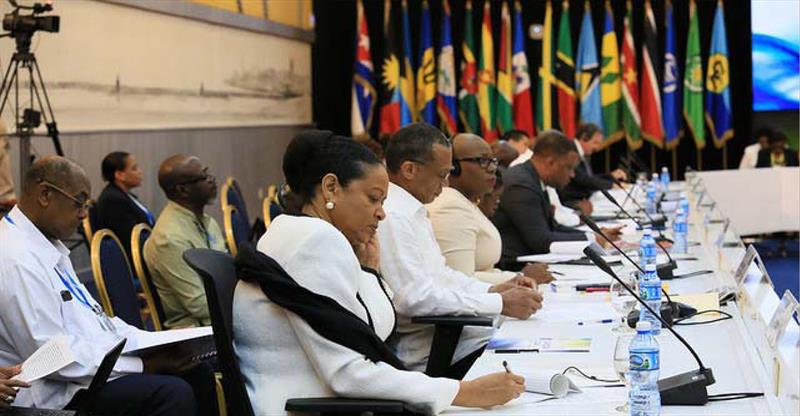Cuba currently has 1538 cooperation personnel in CARICOM countries, most in the health sector.
 Meetings of the Association of Caribbean States (ACS) and of CARICOM took place in Havana, Cuba, at the ministerial level, from March 8 to 11.
Meetings of the Association of Caribbean States (ACS) and of CARICOM took place in Havana, Cuba, at the ministerial level, from March 8 to 11.
The meetings were held with the aim to strengthen unity and regional exchange.
Cuba provided CARICOM an extension of the Agreement on Trade and Economic Cooperation (second protocol), which facilitates access to the Cuban market for hundreds of CARICOM products, as well as trade between the two parties. Projects were approved by the Association of Caribbean States to protect the sandy coasts of the Caribbean, coral reefs and for the control of the sargassum, and invasive species. Both parties worked on the identification of financial and technological resources to implement cooperation.
It was agreed that the sixth CARICOM-Cuba Summit will be convened in Antigua and Barbuda in December 2017. The summit has been held since 2002, and every three years since the establishment of diplomatic relations with Cuba on Dec. 8, 1972, by four independent Caribbean countries at that time: Barbados, Guyana, Jamaica and Trinidad and Tobago.
Cuba's cooperation with the Caribbean has a high social impact. Currently, Cuba has 1,538 cooperation personnel in CARICOM member countries, most of them in the health sector, but also in education, construction, sport, and agriculture. A total of 5,432 Caribbean students have graduated in Cuba. Additionally, 822 Caribbean students are now studying in Cuba. More than 500 Cuban sport coaches have cooperated with the Caribbean and 325 Caribbean people have graduated in Cuba in the field of sport.
Cuba offers priority to Haiti, where it has 689 health workers. After Hurricane Matthew, Cuba donated 900 tons of food and materials to Haiti. Projects are underway with Cuba for the opening of the Regional School of Arts in Jamaica (including dance, music, theater and fine arts) and the Regional Center for Children and Youth with special educational needs in Guyana. Cuba has organized two regional workshops on confronting natural disasters. Cuba contributed to the construction of the Argyle airport in St. Vincent and the Grenadines, completed on Feb. 14. In 2016, Cuba had commercial operations with all Caribbean countries and doubled its trade with the Caribbean countries. Cuba is willing to develop the multi-destination in the tourism sector with the Caribbean. The meetings in Havana considered the development of cultural exchange in the region as instrument for sustainable development, unity, peace, education and understanding.
In Saint Lucia, Cuba maintains medical personnel, including the provision of personnel and supplies for the ophthamology clinic, as well as engineers, sports coaches, and continuing the annual scholarship program through which more than 500 Saint Lucians have graduated in Cuba and more than 50 are currently studying in Cuba. Cuba also maintains exchanges in the spheres of education and culture, and works to identify new technical exchange and trade opportunities.
The high level Caribbean meetings in Havana also highlighted the need for Latin America and the Caribbean to unite to face external challenges, international uncertainty and to guarantee the independence, development and well-being of our region.
The Latin American and Caribbean region was ratified as a zone of peace. Cuba thanks the Caribbean for its solidarity and courageous support, and will continue to share its modest achievements with the Caribbean.
The meetings included the First Cooperation Conference, the 12th meeting of the Council of Ministers of the Association of Caribbean States, and the fifth CARICOM-Cuba Ministerial Meeting.